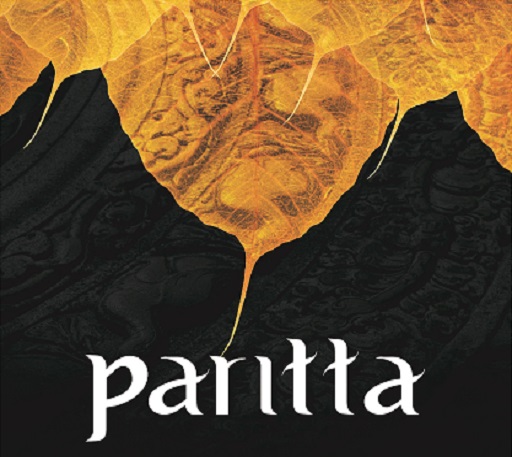No. 494.
SĀDHĪNA-JĀTAKA.
[355] “A wonder in the world,” etc.—This story the Master told while dwelling in Jetavana, about lay Brethren who took on the fast-day vows. On that occasion the Master said: “Lay Brethren, wise men of old, by virtue of their keeping the fast-day vows, went in the body to heaven, and there dwelt for a long time.” Then at their request, he told a story of the past.
p. 224
Once upon a time, there was a King Sādhīna in Mithilā, who reigned in righteousness. At the four city gates, and in the midst of it, and at his own palace door he caused to be made six alms-halls, and with his almsgiving made a great stir through all India. Daily six hundred thousand pieces were spent in alms: he kept the Five Virtues, he observed the fast-day vows; and they of the city also, following his admonitions, gave alms and did good, and as they died, came to life at once in the city of the gods.
The princes of heaven, sitting in full conclave in Sakka’s justice hall, praised Sādhīna’s virtuous life and goodness. The report of him made all the other gods desirous to see him. Sakka, king of the gods, perceiving their mind, asked, “Do you wish to see King Sādhīna?” They replied, yes they did. Then he commanded Mātali, “Go to my palace Vejayanta, yoke my chariot, and bring Sādhīna hither. “He obeyed the command and yoked the chariot, and went to the kingdom of Videha.
It was then the day of full moon. At the time when people had partaken of their evening meal, and were sitting by their doors at their ease, Mātali drove his chariot side by side with the moon’s disk. All the people called out, “See, two moons are in the sky!” But when they saw the chariot pass by the moon, and come towards them, then they cried, “’Tis no moon, but a chariot; a son of the gods, it would seem. For whom is he bringing this divine car, with his team of thorobreds, creatures of the imagination? Will it not be for our king? Yes, our king is a righteous and good king!” In their delight they joined hands with reverence, and standing repeated the first stanza:
“A wonder in the world was seen, that made the hair uprise:
For great Videha’s king is sent a chariot from the skies!”
[356] Mātali brought the car close, and then whilst the people worshipt with flowers and perfumes, he drove it thrice round the city right-wise. Then he proceeded to the king’s door, and there stayed the chariot, and stood still before the western window, making a sign that he should ascend. Now that day the king himself had inspected his alms-halls, and had given directions how they were to distribute; which done, he took on him the fast-day vows, and thus spent the day. Just then he was seated on a gorgeous dais, facing the eastern window, with his courtiers all around, discoursing to them on right and justice. At that moment Mātali invited him to enter the chariot, and having done this went away with him.
To explain this, the Master repeated the following stanzas:
“The god most mighty, Mātali, the charioteer, did bring
A summons to Vedeha, who in Mithilā was king.
p. 225
“O mighty monarch, noble king, mount in this car with me:
Indra would see thee, and the gods, the glorious Thirty-three,
And now they sit in conclave all, bethinking them of thee.”
“Then King Sādhīna turned his face, and mounted in the car:
Which with its thousand steeds then bore him to the gods afar.
“The gods beheld the king arrive: and then, their guest to greet
Cried, “Welcome mighty monarch, whom we are so glad to meet!
O King! beside the king of gods we pray you take a seat.”
“And Sakka welcomed Vedeha, the king of Mithilā town,
Ay, Vāsava 1 offered him all joys, and prayed him to sit down.
“Amid the rulers of the world O welcome to our land:
Dwell with the gods, O king! who have all wishes at command,
Enjoy immortal pleasures, where the Three-and-thirty stand.”
[357] Sakka king of the gods gave him the half of the city of the gods, ten thousand leagues in extent, and of twenty-five millions of nymphs, and of the palace Vejayanta. And there he dwelt for seven hundred years by man’s reckoning, enjoying felicity. But then his merit was exhausted in that character in heaven; dissatisfaction arose in him, and so he spoke to Sakka in these words, repeating a stanza:
“I joyed, when erst to heaven I came,
In dances, song and music clear:
Now I no longer feel the same.
Is my life done, does death draw near,
Or is it folly, king, that I must fear?”
Then Sakka said to him:
“Thy life’s not done, and death is far,
Nor art thou foolish, mighty one:
But thy good deeds exhausted are
And now thy merit is all done.
“Still here abide, O mighty king, by my divine command;
Enjoy immortal pleasures, where the Three-and-thirty stand 2.”
[358] But the Great Being refused, and said to him:
“As when a chariot, or when goods are given on demand,
So is it to enjoy a bliss given by another’s hand.
“I care not blessings to receive given by another’s hand,
My goods are mine and mine alone when on my deeds I stand.
“I’ll go and do much good to men, give alms throughout the land,
Will follow virtue, exercise control and self-command:
He that so acts is happy, and fears no remorse at hand.”
On hearing this, Sakka then gave orders to Mātali: “Go now, convey King Sādhīna to Mithilā, and set him down in his own park.” He did so. The king walked to and fro in his park; the park-keeper espied
p. 226
him, and, after asking him who he was, went to King Nārada with the news. When he learnt of the king’s arrival, he sent on the keeper with these words: “You go on before, and prepare two seats, one for him and one for me.” He did so. Then the king asked him, “For whom do you prepare these two seats?” He replied, “One for you, and one for our king. Then the king said, “What other being shall sit down in my presence?” He sat upon one seat, and put his feet on the other. King Nārada came up, and having saluted his feet, sat down on one side: now it is said he was the seventh in direct descent from the king, and at that time the age of man was fivescore years. So long was the time which the Great Being had spent, by the might of his goodness. He took Nārada by the hands, and, going up and down in the pleasaunce, recited three stanzas:
“Here are the lands, the conduit round through which the waters go,
The green grass clothing it about, the rivulets that flow,
[359] “The lovely lakes, that listen when the ruddy geese give call,
Where lotus white and lotus blue and trees like coral 1 grow,
—But those who loved this place with me, O say, where are they all?”
“These are the acres, this the place,
The pleasaunce and the fields are here:
But seeing no familiar face,
To me it seems a desert drear.”
Hereupon Nārada said to him: “My lord, since you departed to the world of the gods seven hundred years have gone by; I am the seventh in line from you, your attendants have all gone down into the jaws of death. But this is your own rightful realm, and I beg you receive it.” The king answered, “My dear Nārada, I came not here to be king, but to do good I came hither, and good I will do.” He then said as follows:
“Celestial mansions I have seen, shining in every place,
The Thirty-three archangels, and their monarch, face to face.
“Joys more than human I have felt, a heavenly home was mine,
With all that heart could wish, among the Thirty-three divine.
“This I have seen, and to do deeds of virtue I came down:
And I will live a holy life: I want no royal crown.
[360] “The Path that never leads to woe, the Path the Buddhas show,
Upon that Path I enter now by which the holy go.”
So spake the Great Being, by his omniscience compressing all into these stanzas. Then Nārada again said to him, “Take the rule of the kingdom upon you;” and he replied, “My dear son, I want no kingdom; but for seven days I wish to distribute again the alms given during these seven hundred years.” Nārada was willing, and doing as he was
p. 227
requested, prepared a vast largess for distribution. For seven days the king gave alms; and on the seventh day he died, and was born in the heaven of the Thirty-three.
When the Master had ended this discourse, he said, “Such is the performance of the holy-day vows which it is duty to keep,” and declared the Truths: (now at the conclusion of the Truths, some of the lay Brethren entered on the fruition of the First Path, and some of the Second:) and he identified the Birth: “At that time Ānanda was King Nārada, Anuruddha was Sakka, and I myself was the King Sādhīna.”
Footnotes
225:1 Another name of Indra.
225:2 The scholiast explains:”I will give you the half of my merit, so remain here by my power.”
226:1 Erythrina indica.

![[PDF] The book of the Discipline – Vinayapiṭaka – The full 6 Volumes](https://en.namo84000.org/wp-content/uploads/2023/12/The-Book-of-the-Discipline-Vinaya-Pitaka.jpg)


![[En] Guide to Tipitaka](https://en.namo84000.org/wp-content/uploads/2021/10/Kinh-Phat-Quan-trong-2.jpg)